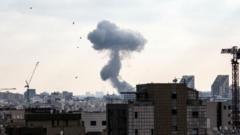The recent military actions taken by the United States against Iran marks a historic escalation, igniting fears of a larger conflict in the Middle East. With Iran facing immense pressure, the world watches closely as both nations navigate a treacherous path ahead.
US-Iran Military Tensions Escalate: A Pivotal Chapter in Global Politics

US-Iran Military Tensions Escalate: A Pivotal Chapter in Global Politics
Tensions soar as the US launches military strikes on Iran's nuclear facilities, reshaping the geopolitical landscape.
The United States has officially broken decades of restraint in its dealings with Iran, launching direct military strikes on the Islamic Republic's nuclear sites, a move considered unprecedented and alarming by world leaders. With the backdrop of a sixteen-year struggle against Iran and its nuclear ambitions, this marks a significant shift in strategy, particularly under the leadership of a president who espoused a peaceful approach to diplomacy.
In response to the assault on its nuclear infrastructures, Iran finds itself cornered. Supreme Leader Ayatollah Ali Khamenei, reported to be in a secure location, stands at a crucial crossroads. His next steps won't just determine his own legacy but will also significantly impact Iran's standing in the region and its tense relationship with the United States. Experts suggest Khamenei can either escalate the conflict and risk severe retaliations or adopt a temperate course that could result in diminishing his own authority.
Moreover, a series of recent and targeted Israeli strikes on Iranian military assets have already caused considerable disruptions within Iran's military structure and relationships abroad. The Islamic Revolutionary Guard Corps (IRGC) has issued stark warnings of potential retaliation against U.S. forces, amplifying the sense of imminent danger that hangs over the recent developments.
The situation is further complicated by internal debates within Iran, as regime supporters argue for a show of strength to counter the perceived threats. However, military actions could escalate into a direct confrontation with U.S. forces stationed throughout the Middle East, which would lead to a catastrophic response. The strategic Strait of Hormuz, a vital trade route for global oil, presents another flashpoint that could spiral out of control.
Both sides are aware of the long-standing enmities and the intricate balance of power unique to this geopolitical arena. Historical precedents, such as the U.S. extrajudicial killing of Iranian General Qasem Soleimani in 2020, showcase the precariousness of military engagement, hinting at the potential consequences of miscalculated retaliatory actions.
As diplomatic negotiations appear to stall, the U.S. emphasizes a zero-tolerance stance regarding Iran's nuclear advancements. Recent negotiations in Europe ended with Iran asserting that any resolution must come without coercion, asserting its right to pursue nuclear energy. The rising tensions showcase a broader discord regarding nuclear proliferation, territorial integrity, and diplomatic engagement.
While Washington asserts military strength, Iran exhorts its right to retaliate while negotiating a tougher stance on its nuclear program. The future remains uncertain as pressure mounts from various factions within both countries. Global leaders, particularly in Europe, are urging for immediate de-escalation and a return to diplomatic discourse to prevent a military clash that could reshape international relations.
As the U.S. grapples with internal political pressures and international expectations, the unfolding crisis urges caution and deliberation. The implications of these military operations could irrevocably alter the dynamics between the U.S. and Iran, with potential far-reaching effects on global security and diplomacy.
In response to the assault on its nuclear infrastructures, Iran finds itself cornered. Supreme Leader Ayatollah Ali Khamenei, reported to be in a secure location, stands at a crucial crossroads. His next steps won't just determine his own legacy but will also significantly impact Iran's standing in the region and its tense relationship with the United States. Experts suggest Khamenei can either escalate the conflict and risk severe retaliations or adopt a temperate course that could result in diminishing his own authority.
Moreover, a series of recent and targeted Israeli strikes on Iranian military assets have already caused considerable disruptions within Iran's military structure and relationships abroad. The Islamic Revolutionary Guard Corps (IRGC) has issued stark warnings of potential retaliation against U.S. forces, amplifying the sense of imminent danger that hangs over the recent developments.
The situation is further complicated by internal debates within Iran, as regime supporters argue for a show of strength to counter the perceived threats. However, military actions could escalate into a direct confrontation with U.S. forces stationed throughout the Middle East, which would lead to a catastrophic response. The strategic Strait of Hormuz, a vital trade route for global oil, presents another flashpoint that could spiral out of control.
Both sides are aware of the long-standing enmities and the intricate balance of power unique to this geopolitical arena. Historical precedents, such as the U.S. extrajudicial killing of Iranian General Qasem Soleimani in 2020, showcase the precariousness of military engagement, hinting at the potential consequences of miscalculated retaliatory actions.
As diplomatic negotiations appear to stall, the U.S. emphasizes a zero-tolerance stance regarding Iran's nuclear advancements. Recent negotiations in Europe ended with Iran asserting that any resolution must come without coercion, asserting its right to pursue nuclear energy. The rising tensions showcase a broader discord regarding nuclear proliferation, territorial integrity, and diplomatic engagement.
While Washington asserts military strength, Iran exhorts its right to retaliate while negotiating a tougher stance on its nuclear program. The future remains uncertain as pressure mounts from various factions within both countries. Global leaders, particularly in Europe, are urging for immediate de-escalation and a return to diplomatic discourse to prevent a military clash that could reshape international relations.
As the U.S. grapples with internal political pressures and international expectations, the unfolding crisis urges caution and deliberation. The implications of these military operations could irrevocably alter the dynamics between the U.S. and Iran, with potential far-reaching effects on global security and diplomacy.






















